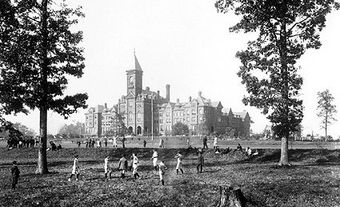Collège classique
Unique to French-speaking Canada, the collège classique (classical college) has over the centuries prepared Québec's social and intellectual elite for higher education. The first classical college was COLLÈGE DES JÉSUITES, established in New France by Jesuit missionaries in 1635. Though the school did not survive the British Conquest in 1760, its legacy lived on. At the close of the 19th century, 19 classical colleges, all of them boys' institutions, were in existence. The first classical college for girls was founded in 1908. In 1966-67 a record number of 98 colleges were in operation across the province. Yet a few years later these private, fee-paying schools had all but disappeared, a casualty of massive reforms in education. The classical colleges lost their identity by virtue of being absorbed into the newly-created CEGEPs.
Until its demise the classical college constituted the only avenue open to French Canadian students aspiring to university. Most colleges offered an 8-year program of academic studies divided into 2 stages of 4 years each: a secondary school course and a collegiate course, in effect the undergraduate program of the arts faculty of a French-language university. The BA was awarded upon completion of the program and permitted the holder to enrol in the university proper.
Because the colleges were administered and staffed by the Roman Catholic clergy, their curriculum showed a pronounced religious and literary bent. Drawing from the example of early Jesuit traditions, students studied Latin, Greek and the writings of the ancients, and took courses in modern languages, philosophy, mathematics and religion. These disciplines were judged proper for the intellectual and spiritual development of the student.

 Share on Facebook
Share on Facebook Share on X
Share on X Share by Email
Share by Email Share on Google Classroom
Share on Google Classroom

